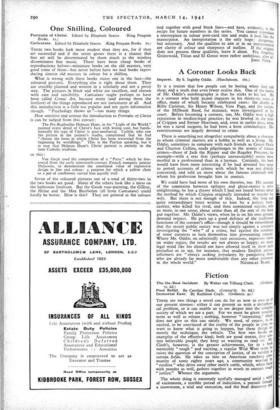A Coroner Looks Back
inquest. By S. Ingleby Oddie. (Hutchinson. I6S.)
IT is a truism that few people can be boring when they talk shop, and a truth that even fewer realise this. One of the merits of Mr. Oddie's autobiography is that he sticks to his last. He is a coroner who held 30,000 inquests in his thirty-six years of office, many of which became celebrated cases: the deaths of Billie Carleton, Sir Henry Wilson, Vera Page, and the victims of the Millbank flood, for instance, were investigated in his court. Before becoming a coroner, too, Mr. Oddie won a high reputation in medico-legal practice; he was briefed in the trials of Crippen and Steinie Morrison, and, even in earlier days, when he was a naval surgeon, he had been a keen criminologist. His reminiscences are largely devoted to crime.
There is something not altogether sympathetic about a character to whom criminal matters are a hobby as well as a living. Mr. Oddie, sometimes in company with such friends as Conan Doyle and dhurton Collins, made pilgrimages to the scenes of famous crimes—those of Jack the Ripper and the Rugeley Poisoner, for example—with a zest that (perhaps unreasonably) seems more morbid in a professional than in a layman. Certainly, his book would have been more interesting if he had devoted less space to potted accounts of crimes with which he was not directly concerned, and told us more about the famous criminals with whom his profession brought him in contact We could have had more of his own theories, too. His account of the connexion between epilepsy and ghost-stories is most enlightening; he has a theory which I had not heard before about the method by which Crippen originally intended to murder his wife. But there is not enough of this. Indeed, the long and quite extraordinary letter written to him by a jealous bank- cashier, who killed his rival, and then committed suicide, tells us more, in one sense, about crime than all the rest of the book put together. Mr. Oddie's views, when he is on his own ground, demand respect. He puts up a good defence of the traditional functions of the coroner's office—though it should be remembered that the recent public outcry was not simply against a coroner's investigating the " why " of a crime, but against the tendency of some coroners to turn themselves into prosecuting counsel. Where Mr. Oddie, on admittedly rare occasions, expresses views on wider topics, the results are not always so happy; an acute legal mind like his should not have allowed itself to show such prejudice as to say, for instance, that modern English prison- reformers are " always seeking popularity by pampering those who are already far more comfortable than any other prisoners






























 Previous page
Previous page